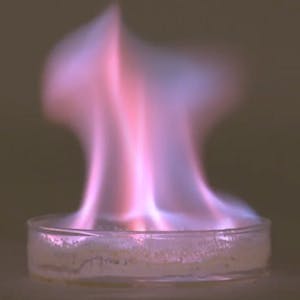This introductory course, "Introduction to Chemistry: Structures and Solutions," is designed for students with limited background in chemistry. It emphasizes basic concepts such as atomic and molecular structure, phases of matter, and quantitative problem solving.
The course is structured to prepare students for further study in chemistry. It covers a range of topics including the scientific method, measurement and significant figures, energy, light waves, quantum numbers, Lewis dot structures, formal charge, VSEPR theory, gas laws, intermolecular forces, phase changes, and solutions. The course modules are designed to provide a comprehensive understanding of these fundamental concepts.
Certificate Available ✔
Get Started / More Info
This course comprises modules covering fundamental chemistry concepts such as the scientific method, energy, light waves, quantum numbers, gas laws, and solutions, providing a comprehensive understanding of these topics.
The first module, "Review Videos (I)," provides an introduction to the scientific method, measurement and significant figures, and energy. It includes demonstrations of physical and chemical changes, laying the groundwork for understanding the fundamental principles of chemistry.
The second module, "Light," delves into light waves, blackbody radiation, wave-particle duality, atom emission spectra, the Bohr model, and colored flames. It also includes exercises to reinforce learning.
The third module, "Quantum Number, Lewis Dot Structure," covers quantum numbers, electron configurations, core and valence electrons, and the construction of Lewis dot structures. It also includes exercises to solidify understanding.
The fourth module, "Formal Charge, VSEPR Theory, Hybridization," explores formal charge, resonance, valence shell electron pair repulsion, sigma and pi bonds, and hybridization. It includes exercises and problem sets for application of concepts.
The fifth module, "Phases of Matter, Gas Laws," discusses compressibility, gas phase, ideal gas law, gas law for partial pressure, and the importance of thermal energy, as well as the phases of matter, focusing on liquids. It also includes exercises for practice.
The sixth module, "Intermolecular Forces and Phase Changes," covers intermolecular forces, phase changes, and properties of solids. It provides a comprehensive understanding of the behavior of different phases of matter and includes exercises for application.
The seventh module, "Solutions," emphasizes the introduction to solutions, electrolytes, dissolution, solubility product constant, solubility rules, and solution calculations and dilutions. It also includes an interview with Dr. Dubay and advanced problem sets for further practice.
The eighth module, "Strengthen Your Understanding," provides a summary and reinforcement of the concepts covered throughout the course, ensuring a comprehensive understanding of the fundamental principles of chemistry.
The Beer Quality Specialization offers brewers an in-depth understanding of key markers of beer quality, guided by expert Charlie Bamforth.
Iniciándome en la Química is a foundational course providing a comprehensive understanding of general chemistry principles and their practical applications.
La Química de las Reacciones es un curso introductorio que explora las bases de las reacciones químicas y su aplicación en la vida cotidiana.
Statistical Molecular Thermodynamics explores the relationship between molecular properties and macroscopic chemical systems.